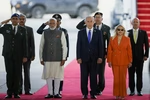
Instead of facing obstacles, tests and “further steps,” Bosnia and Herzegovina should be admitted to the European Union as a form of reparations to correct the injustice that the people have suffered, philosophy professor David Pettigrew said on Sunday, stressing that the international community should “recognise its responsibility” for not preventing crimes originating from Belgrade and Zagreb.
Speaking at a press conference prior to the session of the independent intellectuals 'Krug 99', Pettigrew said that the announcement by president of the European Commission, Ursula von der Leyen, about the Commission recommending the opening of the accession negotiations with BiH in anticipation of “further steps” seems to only delay the process that should be resolved with a much greater sense of urgency.
Pettigrew is a professor of philosophy and Holocaust and genocide studies at Southern Connecticut State University and member of the Board of Directors of the Genocide Study Program at Yale University (USA). In Sarajevo, he joined the discussion on the topic 'Universal principles and Bosnian reality'.
Although he welcome the announcement of the recommendation for opening of the accession talks, he deems that BiH's accession to the European Union should be resolved and accelerated as a matter of “restorative justice” in order to “repair the damage” or “correct the injustice” that was done to Bosnia and Herzegovina.
In this context, he recalled that the citizens of BiH were victims of documented war crimes from 1992 to 1995, including crimes against humanity and the genocide in Srebrenica.
At the same time, he said that BiH should be given the right to democracy and human rights, recalling the decisions of the European Court of Human Rights in Strasbourg, whose judgments called for “democratic arrangements without delay.”
Appellant before the European Court of Human Rights (ECtHR) and the keynote speaker Azra Zornic pointed out the importance of respecting universal international legal standards and principles within BiH. Zornic addressed that court, because she could not participate as a candidate in the elections for the House of Peoples and the Presidency of BiH as she does not declare as a member of any ethnic group.
Nearly ten years ago, the European Court of Human Rights ruled in the 'Zornic vs. BiH' case, concluding that there had been a violation of Article 14 (prohibition of discrimination) in connection with Article 3 of Protocol No. 1. (right to free elections) with the European Convention on Human Rights, and that there was also a violation of Article 1 of Protocol No. 12 (general prohibition of discrimination) with the European Convention.
Zornic underlined once again that she will not give up on her court-chosen right in accordance with international legal standards.
“After 19 years of my struggle, I will not give up the court-chosen right to be allowed to be Bosnian by nationality without ethnic or any other affiliation, because I believe that this is a personal and private choice of every individual of our homeland,” she stressed.
She also emphasised that this struggle continues through communication with the Committee of Ministers responsible for supervising the execution of ECtHR judgments, as well as on the “home ground” through the filing of criminal charges against persons responsible for the (non)implementation of judgments of that court.
Kakvo je tvoje mišljenje o ovome?
Učestvuj u diskusiji ili pročitaj komentare





 Srbija
Srbija
 Hrvatska
Hrvatska
 Slovenija
Slovenija



























































